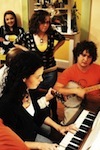 I’m dumbfounded. My preliterate preschooler is turning into a little journalist, and I have no idea why. When she sees me with scraps of paper, it is more often to make a grocery list than anything else, which she’s at least mildly aware of since I always start my list by asking, “Lily, what should we get from the grocery store?” To which she replies something like, “Cereal, strawberries, and chocolate.” I’d like to think that it’s the writer in me that has somehow projected the importance of literacy to my child and she’s absorbing my love of the written word, but I don’t think that’s it.
I’m dumbfounded. My preliterate preschooler is turning into a little journalist, and I have no idea why. When she sees me with scraps of paper, it is more often to make a grocery list than anything else, which she’s at least mildly aware of since I always start my list by asking, “Lily, what should we get from the grocery store?” To which she replies something like, “Cereal, strawberries, and chocolate.” I’d like to think that it’s the writer in me that has somehow projected the importance of literacy to my child and she’s absorbing my love of the written word, but I don’t think that’s it. I’m dumbfounded. My preliterate preschooler is turning into a little journalist, and I have no idea why. When she sees me with scraps of paper, it is more often to make a grocery list than anything else, which she’s at least mildly aware of since I always start my list by asking, “Lily, what should we get from the grocery store?” To which she replies something like, “Cereal, strawberries, and chocolate.” I’d like to think that it’s the writer in me that has somehow projected the importance of literacy to my child and she’s absorbing my love of the written word, but I don’t think that’s it.
I’m dumbfounded. My preliterate preschooler is turning into a little journalist, and I have no idea why. When she sees me with scraps of paper, it is more often to make a grocery list than anything else, which she’s at least mildly aware of since I always start my list by asking, “Lily, what should we get from the grocery store?” To which she replies something like, “Cereal, strawberries, and chocolate.” I’d like to think that it’s the writer in me that has somehow projected the importance of literacy to my child and she’s absorbing my love of the written word, but I don’t think that’s it.
































